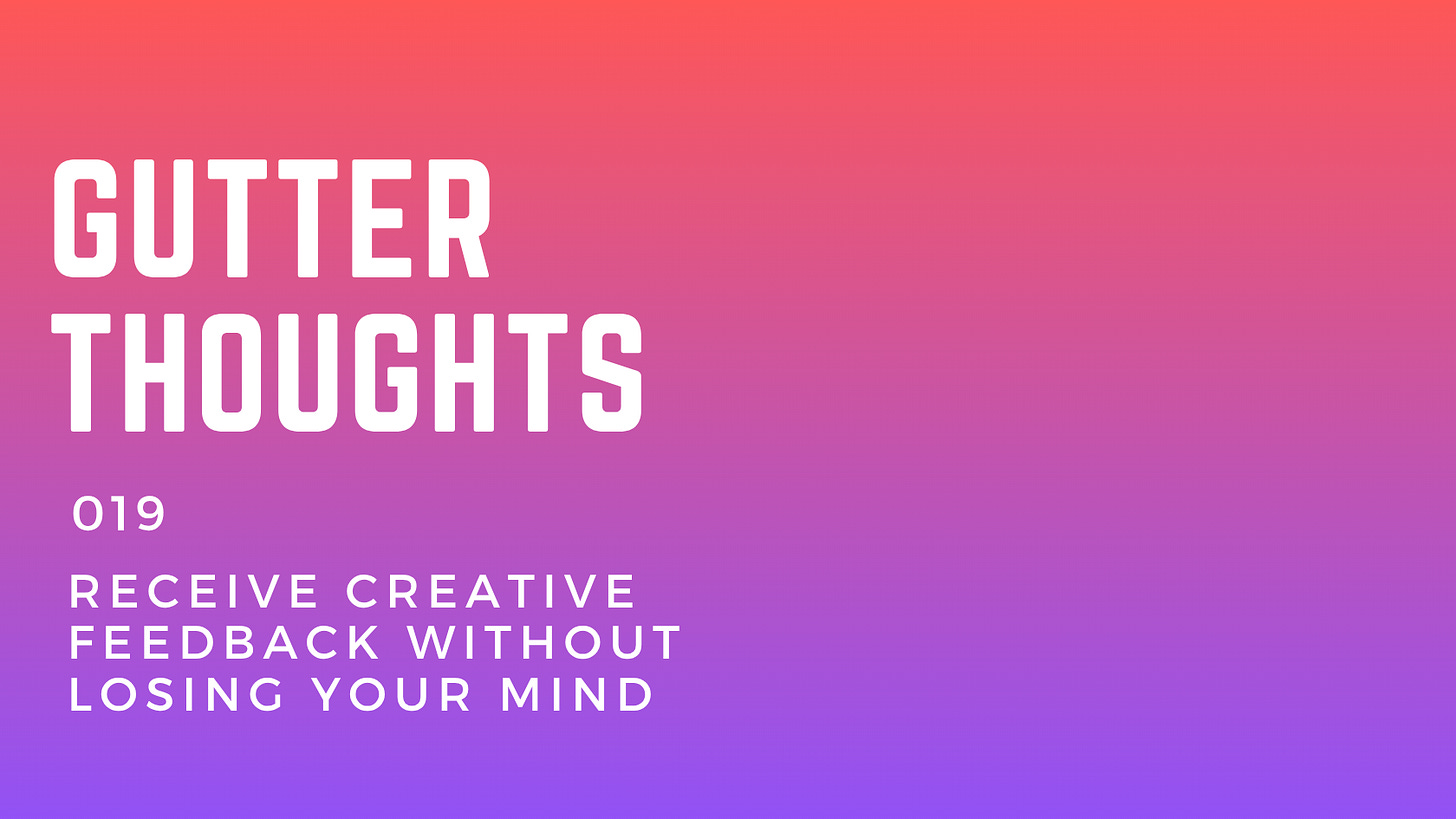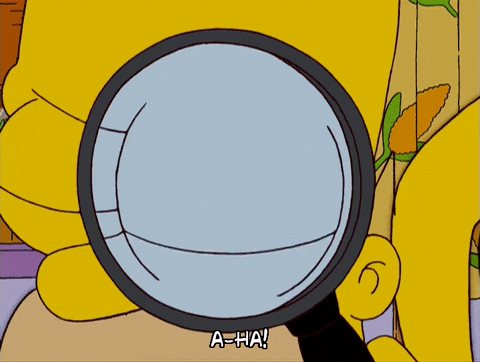Welcome to Gutter Thoughts, where I share insights into my creative process and philosophy each week. From exploring big ideas to finding inspiration in comics, books, shows, and movies, this space is all about staying creative and grounded.
The Stoic Quote of the Week
A Stoic quote to inspire and motivate, helping to stay grounded in the creative process.
“Choose not to be harmed—and you won't feel harmed. Don't feel harmed—and you haven't been.”
—Marcus Aurelius, Meditations 4.7
Weekly Creative Focus
Whether diving into creative work or spending time learning and reflecting, here’s what’s been on the mind and plate this week.
I used to be terrified of feedback, especially about my comics.
Picture this: You’re sitting in a cramped coffee shop, your latest pages spread across a sticky table, waiting for your mentor to arrive. Someone leans over your shoulder and points to a panel you’ve spent three hours perfecting.
"That character expression doesn't match the dialogue," they say casually, like they're commenting on the weather.
Your face flushes hot. Your hands ball into fists under the table. The familiar surge of defensiveness rises in your chest like bile.
How dare they judge my art?
Well, this happened to me.
I'd defend every creative decision like my artistic soul depended on it, my voice getting tighter and more strained as I explained why they were wrong, why they just didn't get it. What should have been a productive conversation became emotional warfare.
Looking back, I realize I was protecting something fragile: my identity as an artist. It felt so intertwined with every line I drew that criticism of my work felt like criticism of my worth as a human being.
But that all shifted when I started writing at Apple.
As a writer working closely with design teams, I discovered feedback wasn't optional—it was essential.
Design reviews, user testing, stakeholder meetings. My work was constantly evaluated and improved by teams of people who saw things I couldn't.
And here's what surprised me: the feedback wasn't meant to tear me down. It came from people who genuinely cared about making the product better.
The Stoics understood this principle long before corporate creative teams existed. Epictetus taught that we suffer not from external events, but from our judgments about them. My emotional pain wasn't coming from the feedback itself. It was coming from my belief that criticism meant I was failing as an artist.
Now I carry these lessons with me whether I'm working on comics, collaborating with other creatives, or tackling any project where my ego might try to grab the steering wheel.
Feedback has become my secret weapon for rapid improvement instead of my greatest fear.
Here are the five strategies that completely transformed how I receive feedback, and how you can extract maximum value from every critique without losing your mind.
Strategy 1: Separate the feedback from the person giving it.
When someone gives you feedback, your brain immediately starts writing stories.
Stories about their intentions, their qualifications, whether they "have the right" to critique your work. This storytelling process, not the feedback itself, is what triggers your emotional response.
I learned this during a brutal portfolio review early in my career. The reviewer's tone was dismissive, almost cruel. But buried in his harsh delivery was a single insight about my use of negative space that completely changed how I approach composition. The message was valuable but it was obvious the messenger was just having a bad day.
Practice this mental shift: treat every piece of feedback as raw data, regardless of who delivers it.
Ask yourself: "If this exact feedback came from someone I deeply respected, how would I receive it differently?"
This simple reframe allows you to evaluate content objectively rather than getting tangled up in feelings about the source.
Strategy 2: Thank them immediately, then process privately.
Your initial response to feedback sets the tone for everything that follows.
And most of us get this spectacularly wrong.
The natural reaction is to defend, explain, or justify when we feel criticized. Our inner voice starts scrambling: "But you don't understand what I was trying to do!"
This defensive response accomplishes two destructive things:
It shuts down the feedback giver (so you get less valuable information)
It reinforces your emotional attachment to being "right" instead of being better.
Viktor Frankl understood this best. He wrote:
"Between stimulus and response there is a space. In that space is our power to choose our response. In our response lies our growth and our freedom."
When someone gives you feedback, there's a crucial pause between hearing their words and reacting to them. That pause is where your power lives.
After reflection, I respond with this automatic response I developed: "Thank you for taking the time to share that with me. I really appreciate your perspective." That's it. Nothing more. Then I excuse myself and process the feedback privately.
This approach accomplishes several things at once:
It keeps the feedback giver engaged and willing to share more insights in the future
It prevents you from saying something defensive you'll regret later
It gives you time to separate your emotional reaction from the actual content
It positions you as someone who values growth over ego
Remember: thanking someone for feedback doesn't mean you agree with it.
It means you value their willingness to help you improve. By consciously choosing your response in that crucial space between their words and your reaction, you're practicing the very discipline that separates reactive people from those who truly grow.
Strategy 3: Look for the 10% truth in every critique.
Even harsh, unfair, or poorly delivered feedback usually contains some kernel of truth.
And that kernel is pure gold for your development.
Your job isn't to accept 100% of every critique you receive. Your job is to mine each piece of feedback for the small percentage that might be accurate and useful. This mental approach completely changes your relationship with criticism because you're no longer trying to defend against it—you're trying to extract value from it.
Think of it like panning for gold.
Most of what you sift through is dirt and rocks, but you're not there for the dirt. You're there for those few precious flakes that make the whole effort worthwhile.
When you receive feedback, ask yourself these three questions:
What's the one thing in this feedback that might be true?
What's the one behavior or technique I could adjust based on this input?
What's the one insight here that could help me improve, even if everything else feels wrong?
This approach works because it acknowledges that feedback is rarely 100% accurate while still allowing you to benefit from the parts that are. You're not accepting everything blindly, but you're also not rejecting everything defensively.
Strategy 4: Reframe feedback as market research about your creative impact.
Instead of thinking "They're criticizing me," think "They're giving me market research about my current impact."
This reframe is powerful because it shifts your focus from protecting your ego to understanding your effectiveness.
When someone tells you your comic's pacing feels rushed, they're not attacking your storytelling ability, they're giving you data about how readers experience your narrative flow.
When someone says your character dialogue sounds unnatural, they're not questioning your writing talent. They're reporting on how your words land with a real human brain.
I've started thinking of feedback like user testing for my art.
In UX research, when a user struggles with an app interface, the developer doesn’t blame the user—they improve the interface. When a reader struggles with my story, I don't blame the reader. I look at how I can tell the story more clearly.
This perspective allows you to treat feedback like a scientist examining experiment results. You're not emotionally invested in the data being "good" or "bad.” You're interested in what it reveals about your current approach and how you might adjust it for better results.
Strategy 5: Focus on what you can control moving forward.
Emotional attachment to feedback usually comes from ruminating on the past: "I can't believe they said that," "That's not fair," or "They don't understand what I was trying to do."
This backward-looking focus keeps you stuck in emotional quicksand.
Instead, train yourself to ask forward-looking questions the moment you receive feedback:
What specific action can I take based on this input?
How can I apply this feedback to improve my next pages or project?
What's one small change I can make immediately?
This approach transforms feedback from a judgment about your past performance into a roadmap for your future improvement. You're no longer defending what you created. You're planning what you'll create better.
Final Thoughts
The beautiful thing about this strategy is that it makes you grateful for feedback because you can see its immediate utility.
When someone's critique helps you create better work next time, it becomes much harder to take it personally.
The goal isn't to become emotionless about your creative work—that would rob your art of its soul. The goal is to channel your emotions in a productive direction.
Let your feelings motivate you to improve rather than defend. Your passion for your art should fuel your growth, not your resistance to getting better.
This Week’s Creative Sparks
Here are the shows, books, movies, comics, and more that have sparked my creativity this week:
Movie Spark: The Phoenician Scheme
I saw the new Wes Anderson film this week, and honestly, I went in with no expectations. I’d seen the trailer once and completely forgot what it was about.
But by the time it ended, it had become one of my favorite films by the renowned director. The visual style hasn’t changed much, still very Wes, but the theme hit deeper than I expected.
This film is a beautiful exploration of memento mori, a philosophy I hold close to my heart. It’s now officially in my top five Wes Anderson movies.
Video Game Spark: Neverway
I watch a lot of game trailers—but this one genuinely piqued my interest.
I’ve always had a soft spot for pixel-animated games. They carry a sense of nostalgia, but more than that, they tend to focus on strong mechanics and storytelling over flashy graphics.
So when I saw a pixel-style game that’s not only visually stunning but also blends in horror elements? I was all in. NeverAwake looks like one to watch.
Animation Spark: Cowgirlies
Lately, the YouTube algorithm has been serving me a steady stream of indie animation—and I’ve been loving it.
This short popped up on my feed, and I was instantly hooked. I caught myself quietly laughing over my morning cup of coffee.
Curious, I dug a little deeper and found out that Cowgirlies has actually been featured in short episodes on Adult Swim. Definitely worth checking out if you enjoy offbeat humor and creative animation.
That’s a wrap for this week’s Gutter Thoughts. Thanks for joining me on this creative journey—hopefully, something here sparked an idea or inspired your own work. Until next time, stay grounded, stay creative, and keep pushing forward.
Let’s Connect
Enjoying Gutter Thoughts?
Imagine having emails like this crafted specifically for your brand or business. Whether you’re a creative storyteller or a brand strategist, I’ll help you turn your unique voice and ideas into engaging, value-packed content.
Ready to level up your email game? Let’s talk about how we can co-create emails that captivate your audience and drive real results.





